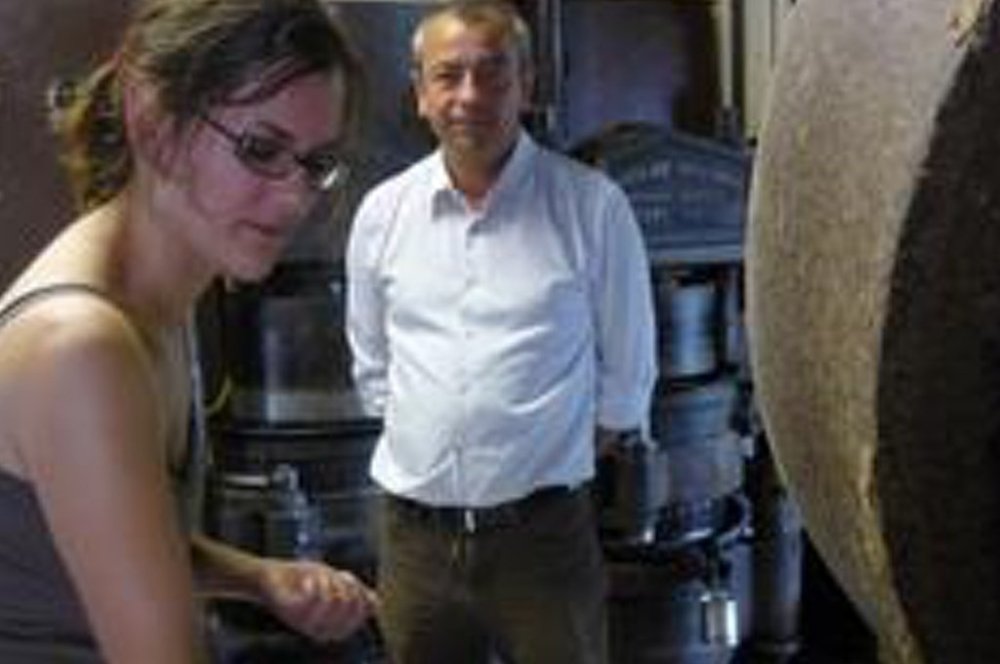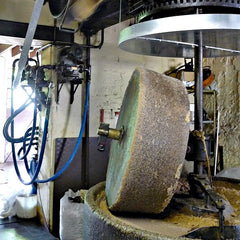
Leblanc oil mill
Anaïs CausseTravelogue Anaïs Causse and Thomas Vetter, Summer 2011
 Around noon we drove relaxed into the mountains of the Massif Central. For Friday we had planned a visit to the Leblanc oil mill, from which we obtain oils, but also vinegar and various types of mustard.
Around noon we drove relaxed into the mountains of the Massif Central. For Friday we had planned a visit to the Leblanc oil mill, from which we obtain oils, but also vinegar and various types of mustard.
The landscape was slowly getting hillier, the weather getting worse. On a mountain pass we drove straight into a huge dark gray cloud that hung in the middle of the mountain road. Then it started to rain like cats and dogs, it stormed, and then it rained seriously. You could hardly see your hand in front of you. Just as suddenly as the spook had come, it was over. And just in time for our arrival in Iguérande, where the oil mill is located, the sun came out from behind the clouds.
We were warmly welcomed by one of the two Leblanc brothers, who are now the fourth generation to run the oil mill.
The Leblancs' oil is still made as it was when the company was founded in 1878. The millstone is over 200 years old, and Monsieur Leblanc attached great importance to emphasizing this.
In order to start the grinding process, a motor is switched on on the wall, which causes a complex combination of gigantic gears and V-belts to run and finally the large grinding stone to move. The process of oil production is actually and has been the same for centuries: the oil fruit, which can be hazelnuts or walnuts, pine nuts, pistachios, grape seeds and much more, is slowly ground for about 20 minutes, then the resulting paste is placed in a huge cast-iron pan , where it is heated over an open fire at a low temperature for about 15 minutes to release the aromas. The mass is then gently pressed in large presses.
The oil obtained in this way is cloudy at first, so it is stored in large canisters for about a month until the cloudy substances have settled to the bottom, and only then is it bottled. If there is a cloudy depot in a bottle with oil at some point, this is nothing bad or bad, just a residue of the pulp of the oil fruit that had not yet settled before bottling. Olive oil is the only oil that is cold-pressed, so the roasting process is omitted, otherwise the manufacturing process is the same.
 The Leblancs only process selected fruits into oil: their pistachios come from Iran, their walnuts come from Périgord, their hazelnuts from Piedmont... They only select the highest quality fruits from around the world to process them, although there is a cost involved only play a minor role. Two examples that underscore their philosophy well: although they could have cheaper ones from California, they order their pistachios from Iran because they think they are much better. And since they haven't been getting good pine nuts for 4 months, pine nut oil hasn't been produced for 4 months.
The Leblancs only process selected fruits into oil: their pistachios come from Iran, their walnuts come from Périgord, their hazelnuts from Piedmont... They only select the highest quality fruits from around the world to process them, although there is a cost involved only play a minor role. Two examples that underscore their philosophy well: although they could have cheaper ones from California, they order their pistachios from Iran because they think they are much better. And since they haven't been getting good pine nuts for 4 months, pine nut oil hasn't been produced for 4 months.
When we asked if they didn't have any problems with the food safety authorities because they produce everything so "old-fashioned", Monsieur Leblanc said that they were checked, quite often in fact, but that they were actually left alone since oil is not Food is food that can go bad during production. And in the end it's very simple - if you don't allow them to produce like they do anymore, then they will stop.
The Leblancs have the vinegar and mustard produced exclusively in two selected companies in the region with exactly the same care. After a small oil tasting, we got into the car with slightly oily snouts and drove on into the mountains.
